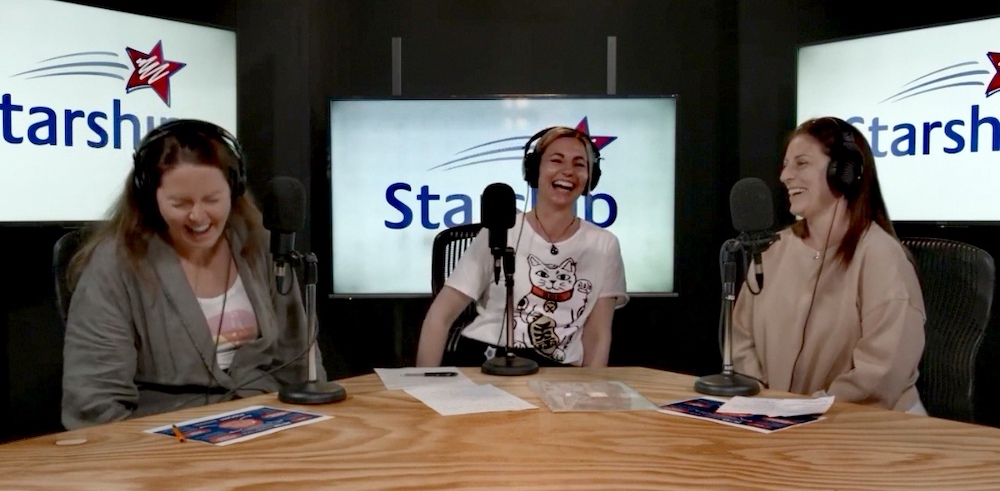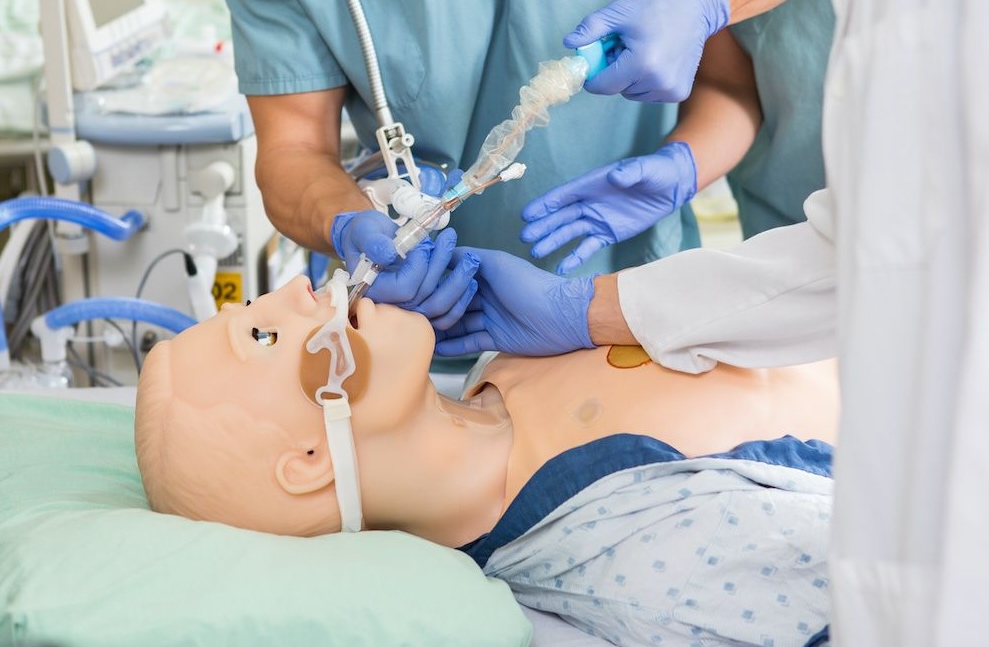Healthcare simulation podcasts are becoming increasingly popular as they offer a way for learners to pursue education on many subjects. There are a number of popular clinical simulation podcasts currently available, such as Simgeeks and Simulcast. As medical simulation podcasts are constantly evolving and gaining popularity, they are a great way for educators to disseminate important information. This article explores a team of healthcare simulation nurse educators’ recent experience starting a clinical simulation podcast, and provides tips on what to consider when seeking to create a specialized healthcare simulation podcast. As well, don’t forget to learn more about all the medical simulation podcasts we know about!
One of the benefits of healthcare simulation podcasts is that they allow listeners to engage with the audio as they complete a multitude of different tasks. For example, clinical simulation learners can play a podcast as they complete chores or commute to work. Additionally, healthcare simulation podcasts are versatile and can be used to convey important information. For this reason, the healthcare simulation community has developed a strong interest in creating content through the art of podcasting.
The first step when establishing a healthcare simulation podcast is to begin researching the overall process. This involves several steps, including the assessment of resources available and determining the focus of the podcast. Below are several important considerations that simulationists should research when beginning this process.
What to Research
Connections and Experience: When exploring the option of starting a podcast, consider the connections known in media or podcasting. If someone has started their own podcast (even better if they are within the clinical simulation community) reach out to them and ask for any advice they may have regarding the creation process. For the “Douglas Starship Simulation Program,” the team had friends with connections to an experienced producer to help them get going with recording and editing. Initially, there were meetings via zoom to gather information and advice so the team could figure out where to focus the start-up research.
Equipment: There are numerous podcast production options that someone can use to get started with at home. Podcast production is now possible on a phone at home. However, creators need to consider sound quality. Listeners will stop listening very early when a podcast presents poor sound quality due to frustration.
Creators can also purchase recording items such as a Rode Podcaster pro – a complete podcast production studio with four microphone inputs. Guests can sit in the studio to record or dial in via phone, WhatsApp, zoom, or their preferred platform. When recording a podcast ensure that the recording area won’t be disturbed to cut down on potential editing time. (For example no dogs in the background or noisy construction nearby.)
Cost Considerations: Even though the overall cost of equipment to start recording a podcast is not high to complete independently; there are considerations that need to be made prior to making this decision. When someone outsources a recording and editing this will cut down on the time required to produce an episode. This will also be dependent on the producer’s turn-around time. Consider the hourly rate and how long editing episodes take. Depending on how in demand a healthcare simulation service is outsourcing the recording and editing of the healthcare simulation podcast may be more cost-effective than independent recording.
Knowing ‘Why’: Clinical Simulation Nurse Educators from the “Douglas Starship Simulation Program” in New Zealand has been working on the release of their podcast season one called “Sim Nurse NZ.” Sim Nurse NZ is available on Spotify, Apple podcasts, and all other podcast listening platforms and has recently been released. When planning for designing their podcast the team of Nurse Educators (Erin, Marie, and Alison) thought hard about why they wanted to start a healthcare simulation podcast. They started by researching what podcasts were currently available relating to both nursing and clinical simulation. The team came to realize that there was very limited podcast content relating to clinical simulation through the nursing lens.
Even though the Sim Nurse NZ podcast is an inclusive podcast and includes viewpoints and guests from all healthcare clinicians, they really wanted the simulation nursing lens to be at the forefront. Next, they thought about what they wanted to achieve. As a team, the goal of the “Douglas Starship Simulation Program” became to share expertise, especially in those areas with limited resources and accessibility.
This is because podcasting is a great way to increase accessibility to expert advice and innovations to inspire clinical simulation programs all over the world. The ability to do so is particularly relevant to those with fewer resources from large organizations. Thus, the Sim Nurse NZ is specifically targeted to any team member with an interest in healthcare simulation, and who needs encouragement to get started from the grassroots level.
Planning Considerations and Tools: A professional Canva subscription can be a worthwhile investment as a team. This is a fantastic tool for creating reports, episode plans, and relevant notes. Even more broadly for organizations, Canva is incredibly helpful to create visual reports around season plans of suggested guests and cost reporting. There is also an incredibly versatile logo creator section.
Sim Nurse NZ used Canva to create a podcast logo. The strategy around creating a podcast logo is worth spending some time researching. There are numerous articles online with a lot of ideas of considerations for when creating a logo. Some of the key considerations include not making the logo too busy and full of photos. For example, Sim Nurse NZ intentionally chose an orange-colored logo after researching the most optimal colors for podcast logos.
Healthcare Simulation Podcast Essentials
Creators will need a podcast distributor service that acts like a cloud for podcasts and distributes podcasts to apps such as Spotify and Apple podcasts. Sim Nurse NZ recommends “Pod Bean,” as the team has been utilizing this service for the initial season.
Additionally, be strategic in mapping out what content will be present in each episode and what each season will achieve. Episode one should include an introduction of the members of the podcast and their backgrounds. Be sure to tell listeners about clinical simulation experience to help to draw them in. Otherwise, they may tune out without knowing why they need to listen to what the speakers have to say.
Further, consider if the podcast will have guests and how to plan for this. Episodes do not need to be recorded in their release order. When planning for episodes, think of the big three takeaways from this episode, and ask questions targeting these topics. Don’t save the best until last.
Start with the most interesting questions first. This means that listeners are more likely to get drawn in and continue listening to the end of the episode. Consider the intro, outro, and music. There are numerous free music resources available online. In the credits consider how listeners can connect with the speaker and don’t forget to utilize show notes to provide resources for listeners.
Lastly, finish episodes with a wrap-up of what was discussed so that listeners can reflect on what information they have just listened to. Podcasting is a great way to connect with the international clinical simulation community and share ideas. Hopefully, in the future, there will be many more successful and long-standing clinical simulation podcasts.









